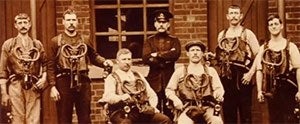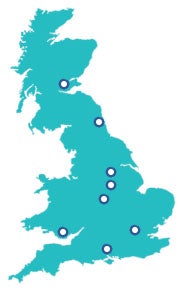A fire at work can have a serious impact on:
- People – who may be killed or injured by the fire or its effects, and who may lose their livelihood due to place of work having to close down
- Property – Fire damage to actual workplace and products can threaten the future existence of the company
- Company – Costs in getting workplace up and running; insurance premiums; improved fire safety; possible court cases; adverse publicity
Fire safety awareness is in everyone’s interest to prevent fires from starting and to mitigate its effects should prevention measures fail.
Which fire safety training course should I choose?
We offer fire awareness and fire warden training suitable for those who require certification for their workplace. Our fire safety courses comply with all current regulations and the requirements of the National Occupations Standards.
Those who complete our courses successfully will receive an MRS Training & Rescue certificate, or a GWO certificate – if they chose to attend one of our renewables industry courses.
Fire Awareness
This FIRE AWARENESS HALF-DAY COURSE is for those who need to understand basic fire awareness, so they are able to safely react in the event of a fire. Everyone who attends this course will get hands-on experience using a live fire extinguisher in a safe and controlled environment – something not many other fire awareness courses include.
Topics covered on this course also include fire classification, the cause of fires, and how they spread, regulations, fire drills and evacuations.
Fire Warden
This FIRE WARDEN HALF-DAY COURSE is for employees who are responsible for the safe evacuation and control of personnel, ensuring all are accounted for, along with the use of portable fire fighting equipment in their workplace. Those who attend this course will learn how to react positively to a fire and about the basic fire hazards and consequential risks in their workplace.
Topics covered on this course also include fire theory and principles, how to use portable fire equipment, hazard identification and control measures and the duties of a fire warden.
Fire Awareness GWO Approved
This GWO FIRE AWARENESS COURSE is for those who work in (or wish to work in) the wind turbines and renewables industry. On this course, delegates will learn how to respond to a fire, in a wind turbine – in a safe manner.
Those who successfully complete this course will receive GWO certification, which is valid for 2 years.
Do you provide on-site and bespoke fire safety training?
Yes, we are able to deliver bespoke courses at our training centres or on your premises, if you’re looking to train more than 1 person. We have experience developing bespoke courses for specific industries and environments – and can include a hose reel fire team training courses – if required.
Frequently asked questions
Why do I need fire safety training?
The Fire Safety order 2005 requires persons who own, manage or operate a business to comply with fire safety law to reduce the risk from fire and make sure people can escape safely if there is a fire.
It is the employer’s duty to undertake a fire risk assessment and put suitable control measures into place.
Employees must co-operate with their employer on any health and safety-related matters - and fire prevention/control is one such area.
By attending and participating in fire safety training, you are cooperating with your employer’s health and safety obligations and have a far greater appreciation of fire prevention and what actions to take should a fire occur.
Why MRS Training & Rescue?
We provide a range of courses suitable for everyone, to provide a greater appreciation of fire prevention in the workplace. Delegates will receive expert tuition on how to reduce the risk of fires and what they need to do if a fire were to occur, ensuring they act safely and do not put themselves in danger.
Training includes both theoretical and practical sessions and the hands-on use of a fire extinguisher. All courses are designed to be engaging, interactive and inclusive of all present.
Our instructors are highly experienced professional rescue operatives, who are trained to the National Occupation Standard of fire fighting in emergency situations, which enables us to offer their knowledge and practical expertise to every delegate. They will share their own experiences with candidates which gives the training an additional dimension and brings the learning to life.
What equipment is used on fire safety courses?
We own and maintain all the equipment used by delegates on our courses – and only use the equipment we trust and would use ourselves. Those who attend our fire safety training courses will get to use a wide range of equipment and will experience using a fire extinguisher and putting out a fire.
We also sell a wide variety of extinguishers and equipment and can also supply PPE for your firefighting personnel – to find out more, contact us.
What is a fire risk assessment?
A fire risk assessment is an organised and methodical review of premises, the activities carried out there – and if a fire was to start, the harm it could cause to those in and around the premises.
The objectives of a fire assessment are:
- To identify fire hazards
- To reduce the risk of fire hazards
- To decide what physical fire precautions are required
- To decide what management arrangements are required (i.e. escape routes)
What is fire?
Fire is the visible effect of the process of combustion – which is a type of chemical reaction that produces energy in the form of heat and light.
Three things must be present at the same time in order to produce fire:
- FUEL - any combustible material - solid, liquid or gas.
- OXYGEN - enough oxygen must be present in the atmosphere surrounding the fuel for fire to burn.
- HEAT - enough heat energy must be applied to raise the fuel to its ignition temperature.
The combustion or chemical reaction will keep going as long as there is enough heat, fuel and oxygen. The combination of these three elements is frequently referred to as the "fire triangle" or “Fire triangle”.
How are fires spread?
When the three elements - Fuel, Heat and Oxygen - are present and combustion occurs, a fire can spread very easily. Heat will always travel from regions of high temperature to regions of lower temperature, no matter how small the temperature difference; it does this either by conduction, convection or radiation.
How are fires extinguished?
As stated earlier, three things must be present for a fire to occur, these being fuel, heat and oxygen. If these exist and a fire does occur, then there are three principal methods that can be used to extinguish the fire. These are:
- Cooling
- Starving
- Smothering
What should I do if I discover a fire / hear fire alarm?
Follow any fire training given
- Raise alarm
- Leave your place of work quickly and calmly using the nearest fire exit (which should be displayed by “running man” symbol) and closing all doors behind you
- Do not stop to take belongings
- Avoid using lifts or elevators unless they have been specially designed for use in the event of a fire and form part of the company evacuation plan
- Once outside go to the designated assembly area.
- Co-operate with fire wardens, marshals, co-ordinators and other such designated personnel
- Do not re-enter the building until told to do so by someone in authority who has been given the all-clear from emergency services












